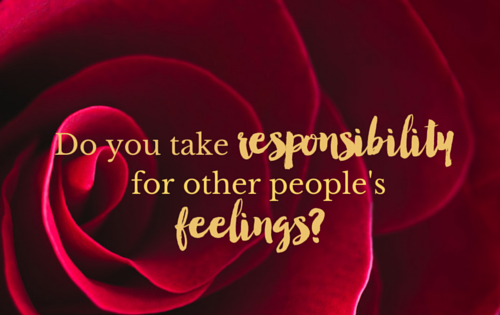Hello!
Do you ever take responsibility for other people’s feelings?
If someone is upset, do you blame yourself or feel uncomfortable?
The language of our culture promotes this.
“You make me feel …”
“You upset me…”
“You hurt my feelings…”
These are ways of thinking that we have often grown up with.
And thinking like this can bring confusion.

I wonder if you remember hearing these kinds of things when you were a child?
Do you remember your parents getting angry, or self-punishing, and blaming you for their feelings?
We often learn to believe that we are responsible for other people’s feelings, and this can continue into adulthood.
I’m glad to say that we can learn to stop believing that we are responsible for other people’s feelings as adults.
The paradox is, this doesn’t mean that we become less empathic.
In fact, it’s more likely to be the opposite.
If we believe we are responsible for someone else’s painful feelings, we are likely to be less available to listen in a compassionate way, because we are likely to be feeling upset ourselves.
Knowing that we aren’t responsible for the feelings of others means that we have more clear space to be fully available to listen to how they are feeling.
Does that resonate for you?
The other day I was doing my Inner Loving Presence Process with my Inner Loving Father. I went back to a past experience when I was a child and was with an adult who was in pain.
At that time, I believed that their pain was my fault.
My Inner Loving Mother gave that little girl me some empathy, but that didn’t do it.
It wasn’t until my Inner Loving Father said to the little girl me, “You aren’t responsible for their feelings,” that the relief came.

We can use this knowledge as parents to help our children know that they aren’t responsible for our feelings.
How might we do that?
One way might be to avoid those ways of talking about feelings that suggest causality, like, “you made me feel,” and instead to make clear that we are responsible for our own feelings instead.
I’m really grateful to Nonviolent Communication for giving me a language that really differentiates between feelings and thoughts, and shows us that it is our needs, whether unmet or met, and our ways of thinking, that create our feelings.
So, instead of, “you made me sad,” or, “you hurt my feelings,” or, “you upset me,” we might say, “I feel sad/upset when you didn’t call when you said you would. I really wanted to connect with you.”
Including the word “when” instead of “made,” and adding our needs, can mean that we aren’t offloading responsibility for our feelings to others.

With younger children, it might just as much be about regularly listening to our own needs and feelings and doing whatever we can to make sure our needs are met, and expressing our sweet spots with a friend, partner or empathy buddy, so we are less likely to express our feelings in ways that our children take responsibility for.
And if we’re right in a sweet spot, sometimes saying aloud something like, “I’m feeling really upset right now. It’s not your fault. I love you,” can actually help us remember that even in the midst of really big feelings, when it really SEEMS like our children ARE causing our feelings, that they aren’t.
Our own big feelings as parents are generally caused by unmet needs, sweet spots (ie. we are being reminded of past painful situations and our feelings are coming up to be heard this time), or old ways of thinking.
The more we can listen to our needs and do whatever we can to meet them;
The more we can listen to our sweet spots and take them to our friends, partner, and empathy buddy to hear;
The more we keep refreshing our ways of thinking to become more and more compassionate,
The less likely we are to respond in ways to our children that ascribe blame to them.
And the beautiful thing is, if we ever do do something where, in the moment, we ARE blaming them, we can always repair that. I have a video on it if you want to find out more – CLICK HERE to watch it.

I’d love to hear how this all sits with you.
Healing our own childhood hurts where we took responsibility for the feelings (and needs) of the adults around us,
Honouring our own needs,
Listening to our feelings with compassion,
and being aware of our language,
all mean we are less likely to give our children the sense that they are responsible for the feelings of others.

I’ve also got some other things to share with you.
My Aware Parenting Babies video has been viewed 23k times! I’m so delighted.
People asked me if I also work with parents of children, so I made a video about Aware Parenting for children,
(wait a couple of seconds after you press the play button – it takes a moment to load!)
and I also made one about the work I do with all mothers.
AND I want to remind you about the Aware Parenting Babies Course that Helena and I have created!
I’m so excited about it! If you are the mother of a baby 0-12 months and you want to understand more about practicing Aware Parenting, come and find out more!
We have 75 sections – most of which are available in all formats (audio, video and written), and you can do it at your own pace and timing!
CLICK on the image to find out more:
Love,
Marion
xxx



